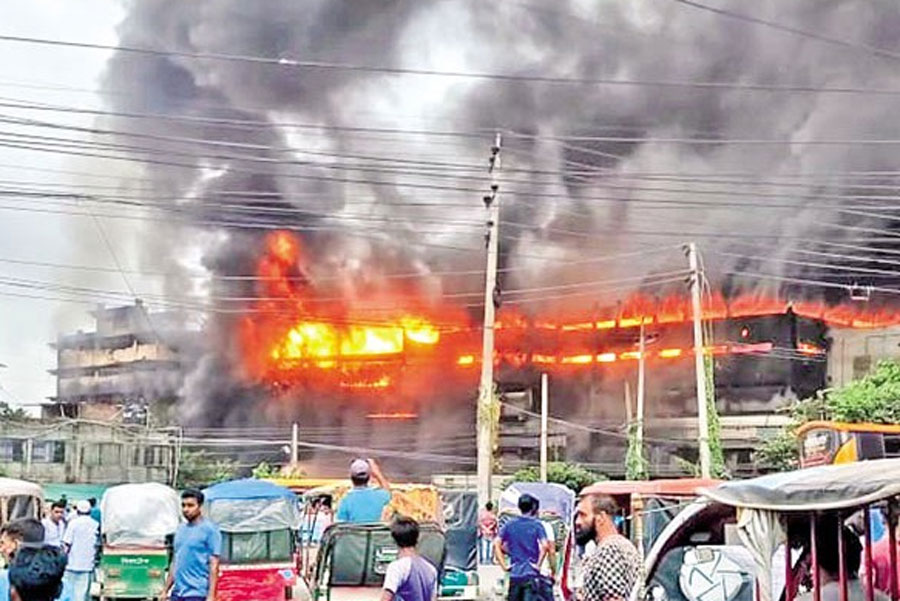
Published :
Updated :

At a time students and people of various walks of life are battling elements to reach flood victims with a single-minded mission of rescuing and providing them with food and other relief goods, there are elements who are setting factories on fire and looting valuables. Aggrieved people unleashed their wrath on establishments owned by high-ups including ministers of the immediate past or earlier cabinets of the deposed Awami League government from August 4, the day before its fall. After the overthrow of the government, anarchy was let loose in the industrial belt of Ashulia and Gazipur. The army was called in to maintain security of factories there.
However, not all industrial units could be protected and more than 30 factories of different types were reportedly torched, vandalised and looted between August 4 and August 27 last. The latest to fall prey to arson attack, vandalism and random looting are the manufacturing units of Gazi Auto Tyres and Gazi Pipe on August 25 and 26. Incidentally, these units sprawling on 45 acres of land in Rupganj, Narayanganj first came under attacks for four days between August 5 and 8, which left those partially damaged. But this latest attack has not only left those facilities to ruins but also claimed scores of lives presumably of those who entered the factories for looting.
Here the mob mentality was at its cynical worst with one group searching for valuables to loot on upper floors and another group setting the first floor on fire all in a frenzy. Reportedly, after 32 hours battle against the inferno, it could be brought under control by the fire fighters but rescue operation for trapped people, dead or alive, could not be conducted for fear of its collapse as well as the overheated interior till Tuesday. There is little chance of discovering any survivor inside the factory. The management of the factories have made it clear that there were no employees inside because the factory had remained closed since before the latest attacks.
Now members of families and relatives of the missing gathered there for information have enlisted 126 names who, they somehow came to know, went there and were untraced by the time the fire was doused. Again, it is students who are enlisting the names of the missing. Life lost in any incident of fire is tragic indeed but when such a large number of people are consumed by fire deliberately started, the magnitude of the tragedy weighs heavily on collective psychology. However, the anarchy set into motion that was responsible for the tragedy gives a bad taste in the mouth. Contrast this with the loss of 46 lives and injury to 75 others in a fire at Green Cozy Cottage Shopping Mall on Baily Road early this year, the feeling of a tug at the heartstrings is overwhelming.
It is a twisted mentality to invade for looting manufacturing establishments owned by people who were parts of the power clique or had allegiance to the deposed government. Admittedly, when in power, many of the owners resorted to unfair and illegal means and tactics for pooling funds and acquiring lands. At the time the aggrieved parties dared not complain or file cases against the powerful industrialists. But this is no excuse for letting loose anarchy in industrial units and reducing those to ruins. They could go to court for redress.
Factories and industries whether in public or private sector are national assets. Law, if allowed to take its own course, can take care of any irregularities that may have been committed at the time of establishing the units. In extreme cases, the court may order government takeover or change in ownership following a due process. Aggrieved parties may thus receive monetary compensation. This is nowhere near wholesale nationalisation that the communists and the followers of socialism opted for in order to do away with private ownership of agricultural land and industries.
How far the anti-discrimination policy will be extended is yet to be known. But to reduce the yawning social disparities, at least the share of the workers in profits has to be enhanced several times over. The pittance most working hands receive cannot bridge the atrocious gap between their incomes and those of the management. Equally true is this for the pay package ratio between the lower grade employees and the top grade officials both in private or public sector.
It is exactly at this point a more pressing issue involving the workers and employees of the factories burnt or otherwise crippled comes to the fore. As many as 2,650 employees and officials of the Gazi Tyre and Gazi Pipe have been rendered unemployed for no fault of their own. At a time the country's factories and industries are struggling to overcome the fallouts of adverse domestic and international developments, such attacks prove to be the last straw on the camel's back. The consequent rise in unemployment unfolds not just a bleak spectre but also one highly foreboding.
nilratanhalder2000@yahoo.com


 For all latest news, follow The Financial Express Google News channel.
For all latest news, follow The Financial Express Google News channel.